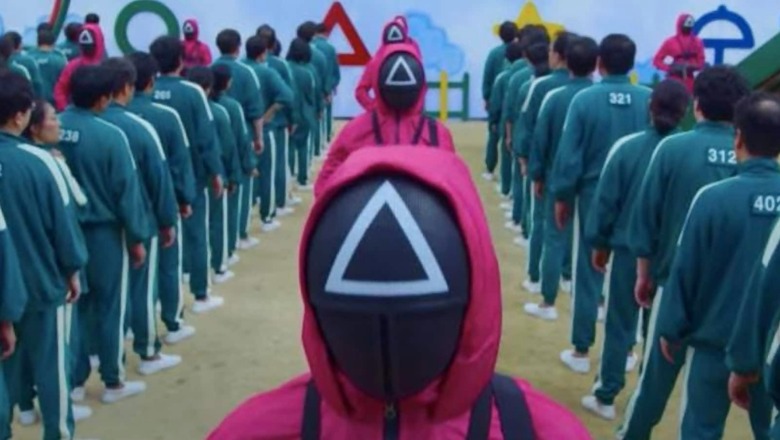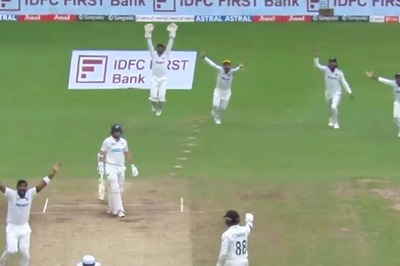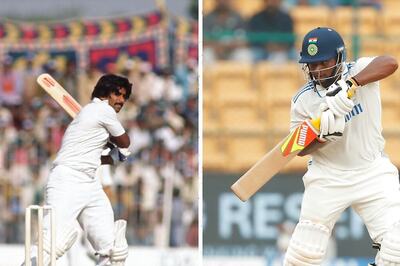
views
Netflix’s Korean drama Squid Game, now the most-watched series of the streaming platform, has launched a million memes and sold a billion dalgona candies since it released on September 17. It has also sparked a debate on what its splatter-film violence, stunningly unrealistic sets, and symbolism-embedded narrative is trying to tell us. The show’s creator, Hwang Dong-hyuk, told Variety last month that he wanted to create an allegory about modern capitalist society, “something that depicts an extreme competition”.
Following him, the Left-leaning Jacobin, described the series to be an allegory for capitalist hell, while The Washington Post praised the forces of late-capitalism and globalisation for making the show available to a wider audience. In this debate, increasingly polarised as is common in our digital world, everyone seems to have missed the fact that Squid Game has become phenomenally popular because it offers familiar pleasures to viewers — of a sports film.
Also Read: Squid Game’s Anupam Tripathi aka Ali Abdul Says He ‘Never Expected This Sort of Response’
Screenwriter Eric R Williams described the sports film to be one of the 11 “super genres” of cinema in his 2018 book The Screenwriters Taxonomy. The others are romance, action, war, thriller, science fiction, slice of life, crime, fantasy, Western, and horror. Professional sports and cinema both emerged in the last decades of the 19th century and became sophisticated and globalised in the early years of the 20th century. Film studies scholar Seán Crosson, in his book Sports and Film (2013), writes that with the development of professional sports in the 20th and 21st centuries, it emerged as one of the most significant cultural practices, “an allegory for life itself”.
A sports film rides on the familiar pleasures of sports while offering resolutions to social tensions. They provide a sort of “utopian solution”, adds Crosson, to the social, political, and cultural tensions by resolving them in the field of play.
While “playing” has been common to all human cultures since prehistory, there is no consensus among scholars on what motivates players or spectators to take part in sports and games. German theorist Carl Diem, who was also the chief organizer of the 1936 Berlin Olympic Games, described play “as a purposeless activity… the opposite of work”. It is autotelic and voluntary. Others claim that games provide a sort of “safety-valve” catharsis. The world of sports is governed by rules — unlike the real world, which is chaotic.
Thus, it offers an escape and a possibility to fulfil desires such as glory and honour. For an athlete, this is a direct result of their performance. Identification with the athlete, often due to a shared nationality, race, or other similarities, provides a similar reaction in spectators. This is often manifested in the violent outbursts of fans at the defeat of their revered athletes, or the orgiastic celebrations in victory.
The sports film uses this cathartic potential by cleverly manipulating the narrative. It operates with genre cliches — the underdog protagonist (Karate Kid), overwhelming odds (Invictus, Lagaan), redemption, and honour (the Rocky series). Rocky will always win the last fight, the team of villagers will defeat the British soldiers in Lagaan. We know it, yet we allow the suspension of disbelief for a cathartic experience. Squid Game, too, utilizes all these cliches. Its protagonist, Seong Gi-hun (Lee Jung-jae), is a chauffeur in Seoul, and a washed-up and unsuccessful man. He lives with his mother, his wife and daughter have left him, and he is addicted to gambling. The game provides him an opportunity to win honour and money. But the odds are low (there are 456 players at the beginning) and the stakes are high (all are equally desperate to win). Leaving the game is not an option either — the world outside is deeply malevolent.
The world inside the game, with its fantastic settings, has been described as unreal — or surreal. Film Studies scholar Anubha Sarkar has, in an essay, traced the Surrealist inspiration for various images in the series. For instance, the staircases the players use to go from their sleeping quarters to the arena of games are similar to MC Esher’s lithographic print Relativity and the VIP guests wearing animal masks can remind one of Tim Burton-directed Alice in Wonderland (2010).
But is this space really that unfamiliar? Have we not seen contestants confined together in a house in reality TV shows like Big Boss? Are the games too dissimilar in their absurdity to the tribulations of participants in the Japanese games show Takeshi’s Castle (also widely popular in India)? Keeping true to the world of dreams, the world of Squid Game is not so unfamiliar to the audience.
Also Read: How Did Netflix’s Squid Game Become a Global Phenomenon? Everything to Know About the South Korean Show
It, however, succeeds in providing a double remove from the real world — first as a dream/nightmare landscape; then as an arena for sports. The games are washed in the blood of the participants, but that too is a ritual purification. As theatre and film scholar Mark Pizzato, writing about depictions of violence in popular culture, writes: “The purging of fear and sympathy… becomes redefined as the purification of desire and drive… This provides a new theory of the potential cathartic purpose of violence in performance.”
The social commentary in Squid Game — on the deep inequality or the debt crisis in South Korea; the problems of migrant workers — provides a ritualistic, “safety-valve” outlet for our anger or frustrations. Squid Game gives so many of us (111 million at last count) around the world so much pleasure because its world and rules are, after all, intensely familiar. It doesn’t ask us to take too many risks — we can watch it while licking on dalgona candy.
The writer teaches journalism at O P Jindal Global University, Sonipat. His novel, Ritual, was published in 2020.
Read all the Latest News , Breaking News and IPL 2022 Live Updates here.

















Comments
0 comment